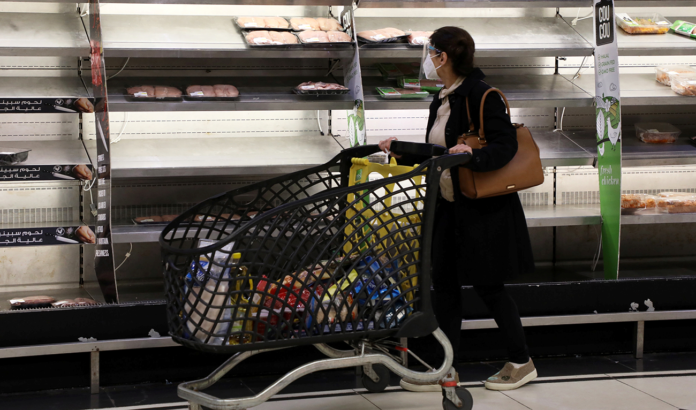BEIRUT: Protesters on Wednesday tried to storm the economy ministry building in Beirut and laid siege to a government minister’s home after Lebanon’s spiralling currency hit a new low.
The protests came as the Lebanese pound continued its slide, plunging to a record 15,000 to the US dollar on the black market.
After several days of relative calm, the latest fall in the currency added to fears of soaring prices and shortages of basic foodstuffs.
Protesters also targeted politicians’ homes following a government decision to reduce spending on subsidies for essential items.
“Why are you clinging to this post? We have no bread. We are starving. We are dying,” protesters shouted outside Trade Minister Raoul Nehme’s house.
After a meeting on Wednesday with Finance Minister Ghazi Wazni, central bank governor Riad Salameh said that the bank’s central council will study proposals in the next 24 hours to bolster the local currency.
A ministry source told Arab News that while the central bank had refused to inject dollars into the market in recent months, it might do so “if the council decides to interfere.”
However, the source said that “this is only a temporary solution — what is needed is a political initiative, the formation of a new government. But this is something that does not seem to be happening anytime soon.”
Wazni told Bloomberg on Tuesday that “Lebanon is gradually losing food subsidies and will raise gasoline prices to save dwindling foreign reserves.”
He said: “The central bank’s foreign reserves now stand at around $16 billion, only $1.5 billion of which can be used to fund subsidies, which can cover two or three months at most, in light of the downturn in dollar flows, the lack of confidence and the political crisis.”
Protesters on Wednesday continued to block roads in Beirut and other areas with garbage bins and burning tires.
They blocked the car of Sheikh Hassan Al-Masri, deputy head of the political bureau of Amal Movement, and yelled: “You are getting paid in dollars and we are dying.”
Cooking oil, milk, rice, sugar and beans disappeared from the shelves of the few grocery stores that dared to open on Wednesday.
A woman told Arab News: “I check the price of the product before checking the product itself. People are being humiliated in an unprecedented way.”
Pharmacy owners decided to close on Thursday due to shortages of drugs.
Ghassan Al-Amin, head of the pharmacist syndicate, said: “This shortage is the result of the delay in the central bank’s approval to subsidize drug imports for over four months.”
Al-Amin said importers are delivering medicines to pharmacies in ridiculously small quantities and the shortage has been worsened by panic buying and hoarding as well as smuggling abroad.
“We are stuck in the a vicious spiral and cannot get ourselves out of it,” he said.
Al-Amin said that more than 600 pharmacies have closed because “profits are no longer enough to cover expenses.”
Mirna Doumit, head of the Order of Nurses in Lebanon, called for a state of emergency in the nursing sector, saying: “More than 1,000 experienced nurses have fled the country, leaving a professional void reflected in the lack of training of young nursing staff.”
Doumit told a media conference that more than 2,000 nurses who contracted COVID-19 faced pay cuts when they missed work due to illness.
“We have lost five nurses to the virus,” she said.

Shoppers brawl as Lebanon’s currency collapse sparks store closuresLebanon approves World Bank rescue plan for needy families

